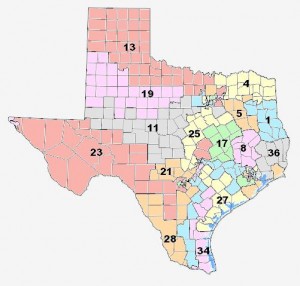
The state of Texas and the U.S. Justice Department presented arguments to a federal court on Wednesday regarding the state’s controversial proposed election maps which could potentially lower the chances of Latinos to choose candidates of their choice in several districts.
The three-judge panel’s decision will have tremendous impact: Texas stands to win four new seats in the U.S. House of Representatives due to the state’s population growth according to the 2010 Census figures.
But even though minorities accounted for 90 percent of the state’s population growth, only one of the state’s four new districts has been designated as a minority district.
Representative Trey Martínez Fischer, a Democrat and the first witness representing the Mexican American Legislative Caucus, argued yesterday that Texas gained those four seats because of minorities.
“The Republican Legislature that drew and passed this map, and the Republican governor who signed this map, and the Republican attorney general who’s defending this map in court chose this opportunity to expand their political power at the expense of minorities,” he said.
According to lawyers for the Justice Department, the new map lowers the chances of Latinos to choose candidates of their choice in districts based in San Antonio and Corpus Christi.
They also believe they uncovered evidence of discrimination by the state and federal lawmakers in Texas, who took race and ethnicity data into account for the redistricting.
Texas, on the other hand, says the emails being cited as evidence were actually an attempt to protect incumbents by taking into account Hispanic populations for the redrawing of district lines.
Because of a history of discrimination against minorities at the ballots, Texas is required to get permission from the federal government or a special federal court before making substantial voting changes like this one, under the 1965 Voting Rights Act.
Voting rights experts say the issues are so complicated that the court might take a long time to consider all aspects and come to a decision.
“A trial will probably take a fair amount of time, a lot of effort by both sides, and I think will draw negative attention to the people who are accused of discriminating on the basis of race,” says University of Michigan law professor Sam Bagenstos.
With primaries beginning in March, however, there is not a lot of time.
“That’s everything from certifying precincts, to having a filing schedule for candidates to run in, and having enough time to print ballots to place them before different precincts throughout the state,” Martínez Fischer says.
Sources:

Recent Comments